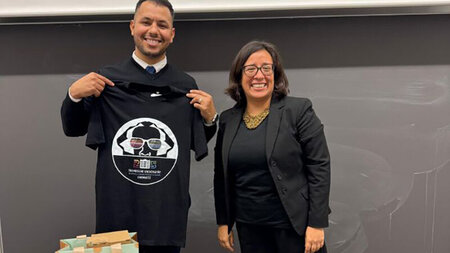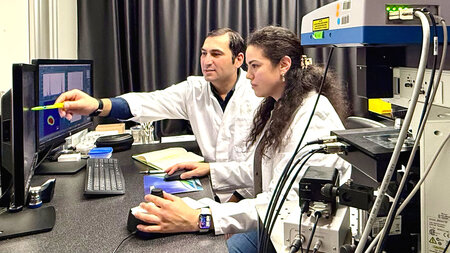Department of Human-Cyber-Physical Systems (HCPS)
Welcome to the Human-Cyber-Physical Systems (HCPS) department.
The sustainable, human-centered industry of the future will be realized through a complex interplay between
Humans (H),
Digital cyber systems (C), which operate, for example, based on advanced digital technologies and artificial intelligence, and
Physical systems (P), encompassing technical machinery and production facilities.
The successful development of Human-Cyber-Physical Systems (HCPS) requires transdisciplinary research and collaboration in order to integrate the insights and strengths of individual disciplines effectively within concrete applications. In fundamental research, technological development, and practical industrial implementation, the human being, with their expertise, needs, and perspectives, should remain at the center of consideration.
Human cognitive abilities and their transparent formalization represent a crucial foundation for designing technical assistance and automation solutions that are meaningful, responsible, and thus sustainable.
The department brings together transdisciplinary expertise at the intersection of psychology, computer science, and mechanical engineering. Its fundamental and applied research addresses questions related to the human-centered design of HCPS, consistently aiming at a systemic, sustainable, and resource-efficient production of the future.
The department's research contributes theoretical and methodological insights that can be applied across various technical domains and research questions. These include, for example, supporting multi-criteria decision-making in surface engineering, the cognition-based design of human-AI systems, the exploration of new assistance and automation solutions such as human-machine teaming, and the promotion of resource-efficient and sustainable practices through human-centered measures.
The department collaborates closely with both university and non-university research institutions as well as industry partners to ensure effective knowledge transfer.
The department's current research priorities encompass the following topics and guiding questions:
(1) Cognitive Engineering:
Human expertise and cognitive abilities are essential for innovative research, technological development, and industrial value creation.
Examples of research questions: How can technical domain knowledge be elicited, systematically described, and digitized in a human-centered and sustainable manner? What levels of knowledge can be differentiated? What strategies do experts use in their knowledge domains to solve problems and make decisions? How can expert strategies be implemented in adaptive systems and also used to empower other people?
(2) Knowledge-assisted visualizations:
Complex technical processes and artificial intelligence algorithms must be task-specific and adapted to the human's level of knowledge. Genuine human-centeredness therefore requires a minimum degree of comprehensibility and transparency, which can be achieved, among other things, through knowledge-assisted representations.
Examples of research questions: How can data, information, and knowledge be presented in a cognition-based and human-centered way? Which psychological principles are relevant for the design of interfaces and interactions when visualizing complex processes and multi-layered issues?
(3) Cognitive decision support and human-machine teaming:
Complex decision-making, problem-solving, or planning processes should be supported by powerful digital-technical capabilities. Viable concepts for new assistance and automation solutions need to be developed for this purpose.
Examples of research questions: Can and should technology become a "team partner" for humans? Which characteristics of successful human-human teams can be transferred to human-cyber teams, and which cannot? How can human work teams be cognitively supported when interacting with cyber-physical systems?
(4) Sustainability through technology acceptance and user research:
New technologies and human-centered measures, e.g., for sustainable, resource-efficient practices in everyday production, are only successful if they are understood, accepted, and implemented by humans.
Examples of research questions: What acceptance requirements exist on the user side for hydrogen-based technologies such as H2 e-bikes to be used successfully and safely? Which systemic approaches and human-centered measures enable actors to transalte sustainability goals into concrete work practices?
Among other things, the following methods are used and further developed:
Observational methods, interviews, psychological experiments, and user studies
Cognitive task analyses, methods for determining (team) situation awareness and mental workload
Eye-tracking and pupillometry
Combined data- and knowledge-based modeling of technical processes (e.g., for multi-criteria decisions and optimization problems) using artificial intelligence methods.
The departments research provides theoretical and methodological insights that can be applied to various technical domains, such as supporting multi-criteria decisions in thermal coating processes. The department collaborates closely with other university and non-university research institutions and industry partners in this area.
Projects:
Project partners
Associated partners
- Fraunhofer IWU Chemnitz
- Continental AG
- secuvera GmbH, BSI-zertifizierter IT-Sicherheitsdienstleister und Prüfstelle
- Aumann AG, Spezialmaschinen und Produktionslinien für Elektromobilität
- CBS Information Technologies AG
- SITEC Industrietechnologie GmbH
- IAOV, Institut für Arbeits-, Organisations- und Verkehrsforschung GmbH
- Saxeed, Gründernetzwerk
- Vitesco Technologies GmbH
Funding

Bundesministerium für Bildung und Forschung (BMBF)
Project duration
July 2019 to March 2023
Description
The aim of this project is to develop a technology-oriented service and software offering for the development and implementation of cognition-based interfaces for human-technology interaction (KoMTI). KoMTI integrates cognitive-psychological insights (including those related to understanding and decision-making processes) with highly transparent and powerful machine learning algorithms to enable a new quality of interaction between humans and (semi-)autonomous technical/digital systems. The project is guided by the principle of helpful technology that supports human self-determination rather than controlling or restricting it. KoMTI is aimed at product developers in the application areas of "Intelligent Mobility" and "Digital Society." It addresses new issues, such as the user-centered design of automated driving functions (including aspects like driving comfort) and the optimization of individual interaction with digital products like apps (e.g., regarding interaction errors, data security, and privacy). The project will result in a modular KoMTI methodology toolkit and a procedural strategy for developing and implementing human-centered interaction interfaces in complex human-technology systems.
Project Demonstrator
Publications and Conference Papers
Assarzadeh, M., Hartwich, F., Vitay, J., Bocklisch, F., & Hamker, F. (in press). Discomfort detection during automated driving using temporal transformers. Frontiers in Computer Science, https://doi.org/10.3389/fcomp.2025.1639505
Heubeck, L., Hartwich, F., & Bocklisch, F. (2023). To Share or Not to Share—Expected Transportation Mode Changes Given Different Types of Fully Automated Vehicles. Sustainability, 15(6), 5056.
Kreißig, I., & Bocklisch, F. (2022). Knowledge matters! - Exploring Drivers and Barriers in the Acceptance of FCEVs as a Sustainable Mobility Solution. Paper presented at the 2nd FC³ Fuel Cell Conference Chemnitz, Chemnitz, Germany
Assarzadeh, R., Hartwich, F., Vitay, J. & Bocklisch, F. (2020). Discomfort detection in autonomous driving using artificial neural networks. In C. Dobel, C. Giesen, L. A. Grigutsch, J. M. Kaufmann, G. Kovács, F. Meissner, K. Rothermund, & S. R. Schweinberger (Eds.), TeaP 2020 - Abstracts of the 62th Conference of Experimental Psychologists (p. 18). Lengerich: Pabst Science Publishers.
Bocklisch, F., Drehmann, R., & Lampke, T. (2020). Kognitionsbasierte Mensch-Technik Interaktion in Cyber-Physischen Systemen am Applikationsbeispiel „Thermisches Spritzen“. MONARCH TU Chemnitz
Bocklisch, F., Kutschmann, P., Drehmann, R., & Lamke, T. (2020). A cognition-based human-machine interaction approach for thermal spraying. In C. Dobel, C. Giesen, L. A. Grigutsch, J. M. Kaufmann, G. Kovács, F. Meissner, K. Rothermund, & S. R. Schweinberger (Eds.), TeaP 2020 - Abstracts of the 62th Conference of Experimental Psychologists. Lengerich: Pabst Science Publishers
Project partners
Funding

Bundesministerium für Bildung und Forschung (BMBF)
Project duration
July 2023 to September 2025
Description
The REDUCE project aims to significantly reduce resource consumption in industrial production. It addresses the sector's substantial share of national resource consumption, including energy (currently around 70%), and contributes to (inter)national efforts toward resource-efficient industrial design, which is urgently needed in light of the current climate crisis. This goal is achieved through a transdisciplinary approach that combines technology-related digitalization and efficient automation solutions with a consistently human-centered approach to technology design, empowering users to act resource-efficiently in production. Following this approach, the work plan includes two complementary analytical approaches, which are integrated into concrete design solutions. Firstly, a comprehensive database of all technical parameters relevant to resource consumption at various levels of production is created using modern sensor and measurement technology. This database forms the basis for identifying specific savings potential. Secondly, a comprehensive process analysis systematically describes the workflows and processes of human actors, from which options for reducing consumption are derived. By systematically considering both analyses, measures for reducing resource consumption are developed and implemented in the form of a demonstrator. The project generates reliable insights into resource-saving potential in the manufacturing sector through human-centered energy management and information systems. The results have high transfer potential and can be used in both scientific dissemination and industry-oriented commercial applications. The project's transdisciplinary approach is made possible by a consortium of partners from engineering and production, visualization, and psychology.
Project Management and Contact Person
Dr. habil. Franziska Bocklisch
Publications and Conference Contributions
Morgenstern, T., Reuter, C., Gleich, S., Lapczyna, E., Thiele, V., Lampke, T., & Bocklisch, F. (2025). Entwicklung einer kognitionsbasierten Schnittstelle für die Mensch-Technik-Interaktion zur Förderung des energieeffizienten Handelns im Produktionskontext. Gesellschaft für Arbeitswissenschaft e.V. Sankt Augustin (Hrsg.), Arbeit 5.0: Menschzentrierte Innovationen für die Zukunft der Arbeit (S. 192-197). GfA Press. ISBN: 978-3-936804-36-2.
Morgenstern, T., Reuter, C., Gleich, S., Lapczyna, E., Thiele, V., Lampke, T., & Bocklisch, F. (2025). Supporting energy-efficient behavior through human-centered digitalization in industrial manufacturing: A transdisciplinary approach. 24. Werkstofftechnisches Kolloquium, 02.-03.04.2025, Chemnitz, Germany.
Dealing with the social challenges in the area of "Intelligent industry" requires broad transdisciplinary co-operation between different specialist disciplines, research institutions and industrial partners.
The series of events" Transdisciplinary dialogue: Humans, technology and AI" will shed light on the interaction between humans, technology and artificial intelligence (AI) from the various perspectives of the specialised sciences. In short presentations, invited speakers will address the humanities, social sciences, humanities and STEM-orientated perspectives and provide impetus on specific topics for the subsequent discussion.
events
Speakers
- Dr. Norbert Huchler (ISF, München):
Sozial nachhaltige Gestaltung der Arbeitsteilung zwischen Mensch und KI
- Dr. Marcel Todtermuschke (Fraunhofer IWU, Chemnitz):
Herausforderungen bei der Programmierung von Karosseriebauanlagen
- Dr. Mohamad Bdiwi (Fraunhofer IWU, Chemnitz):
Von der Angst zum Vertrauen im Kontext Mensch-Schwerlastroboter-Interaktion
Speakers
- Dr. Rudolf Seising (Deutsches Museum, München):
Ich denke und vielleicht denkst Du, aber es denkt nicht! Die vergessenen Geschichten der KI
- Dr. Uwe Haass (Roboconsult, München):
Roadmap KI: Perspektiven für Bildung und Forschung am Beispiel der Robotik
Contact person





